#nimona analysis
Text
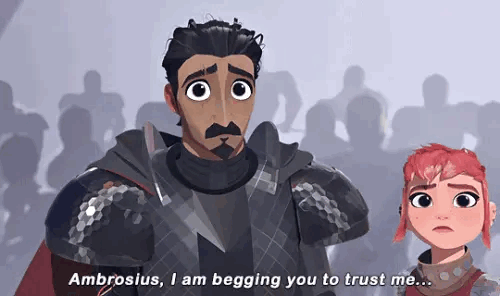
thinking about Nimona’s face in this scene because she already knows how this plays out, she’s lived this already and while Bal has the hope that she once had in his eyes, she KNOWS what happening before the sword is even raised. She’s NOT SURPRISED she’s NOT SHOCKED she’s only DISAPPOINTED that Ambrosius can turn on the man he loves because she’s already played this out with Gloreth
#I CANT#I need to be euthanized#I cannot stop thinking about them#nimona#nimona and ballister#nimona analysis#nimona spoilers#nimona movie#nimona ambrosius#nimona netflix#nimona 2023#nimona ballister#balister blackheart#balister boldheart#ballister x ambrosius#gloreth
30K notes
·
View notes
Text

there’s something so incredibly beautiful about Nimona being able to return once ballister symbolically signaled the last of the institutions hate and the pain it caused as gone by replacing the director poster with the nimona drawing from a child, showing that the hate wasn’t being taught anymore. nimona could live her life in peace
1K notes
·
View notes
Text
One detail I really like in Nimona is that everyone is a terrible detective
Ballister is in the spotlight the most bc he’s actively trying to prove his innocence. Except he’s real bad at it. Like the first time we see him after the whole Queen killing fiasco, his notes on the wall show that he already suspects the Squire knows something.
But then he does literally nothing about it.
Instead he strolls into the Institute with an iron-clad “trust me bro I’m innocent” argument that leads to extremely predictable consequences.
After Nimona gets him out of that mess, he actually talks to the Squire and miraculously get proof of his innocence! And then he promptly decides to not make a backup copy of the recording... or secure a witness statement... or even ensure the safety of his single witness (some knight he is). Instead Ballister simply walks straight back into the Institute again with a new “trust me bro, I’m innocent just look at this thing in my pocket first” and predictably looses all his evidence.
Then a third time, he and Nimona get sneaky and record the Director’s actual confession, uploading it for everyone to see. But they only take a small soundbite, which backfires on them later when the Director makes the very logical “we have proof Boldheart is working with a literal shapeshifter, so maybe it was a shapeshifter that said that.” Ballister and Nimona didn’t even show that the Director was in possession of Ballister’s sword or that she tried to stab Ambrosius.
And Ballister (and by extension Nimona) aren’t the only terrible detectives. It’s implied that nobody did a proper investigation after the Queen’s death or else the Squire’s testimony would have been uncovered.
Plus Ambrosius‘ suggestion that ‘hey maybe we should watch the clip for ten seconds longer to see if there’s anything else we missed” seems like a novel idea instead of standard practice. And upon discovering Ballister’s real sword, Ambrosius also makes no attempt to secure evidence of it’s existence within the Institute (which could prove Ballister’s innocence) and instead gives it away.
Taken at direct face value, this makes the characters seem incompetent and unintelligent. But the genius is that it makes perfect sense within the larger narrative of the story why the knights are not taught investigative or problem solving skills.
They live in a society where “monsters” exist.
If monsters were allowed to have a voice, to prove to others that perhaps they are actually innocent, it would fundamentally shatter the perception that the accused were evil monsters to begin with. And this, in turn, would bring the entire system crumbling down.
Their society is one where anyone can be labeled a monster and there is no room for questions or analysis.
Truth does not matter.
Facts do not matter.
There is simply blind obedience to those already in power.
And this leads to innocent people being hurt.
#nimona#nimona meta#nimona analysis#original post#i promise this was going to be a funny post about how the knights are all dumbasses but then the allegory was RIGHT THERE
957 notes
·
View notes
Text
i keep seeing (hopefully mostly unintentional) whitewashed fanart of Ballister from the Nimona movie and i’d just like to remind any white people who may be doing fanart -
Ballister being brown is a very important part of the film. i know his skin is much lighter in the graphic novel, but as a brown person who watched the film it’s pretty obvious that they cast a Pakistani man to play him because on top of being a trans allegory, it’s also an allegory for racism. it’s intrinsic to the story told in the film.
same thing with Ambrosius being Korean. the story being told with the casting of Riz Ahmed as Ballister and Eugene Lee Yang as Ambrosius is of a brown man being framed to keep the power in the hands of white people, and of those in power using east asians (see: the model minority myth) to prop up white supremacy.
i could go on but i think you get the point. all that to say - the color of Ballister’s skin wasn’t just a choice made in passing to make the cast more diverse. same with Ambrosius. please make sure you’re representing that in your art.
#nimona#ballister blackheart#ambrosius goldenloin#nimona ballister#nimona ambrosius#nimona analysis#riz ahmed#eugene lee yang#whitewashing
971 notes
·
View notes
Text
Why Ambrosius and Ballister’s Relationship Feels So Different in the Movie (Nimona)
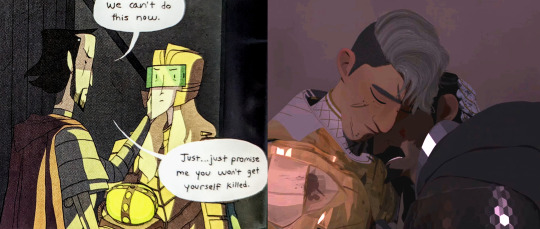
As someone who read Nimona countless times growing up, I am very familiar with the story and these characters. Which is why when I watched the movie, I was struck by how different Ambrosius and Ballister felt. They seemed like totally different and unfamiliar characters to me, and it didn’t have anything to do with their designs.
After rereading the original Nimona graphic novel recently, I’ve come to the conclusion that the main reason they feel like completely different characters in the movie comes down to one thing: the removal of the joust.
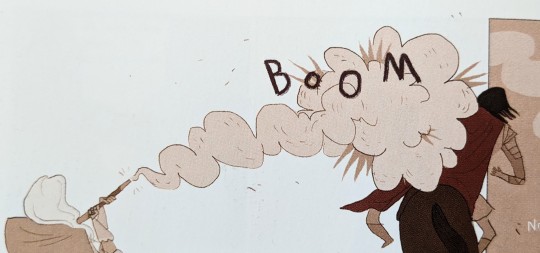
When I watched the movie, I was surprised by the fact that they changed the circumstances that drove these two apart. But it didn’t hit me just how much this one event shapes both of their characters and their relationship to each other until I reread the book.
The joust is CRUCIAL to their dynamic. It pervades every interaction they have with each other, they bring it up constantly, it is literally the crux of their collective storyline. We learn about it on PAGE 5 of the whole book, and their big heart-to-heart when Ballister is captured near the climax of the story is based around Ambrosius finally admitting the truth about what happened. Honestly I’d say that him finally coming to terms with what he did and apologizing for it is probably what allowed these two to finally find peace together by the end of the book.
We get something similar to it in the movie. Ambrosius still is responsible for Ballister losing his arm, but it is under WILDLY different circumstances. So I want to talk about how the joust affects them in the book, and then explain why the movie’s version of events, while similar on the surface, has a completely different effect on everything. So let’s get into it!
(All images of the book are via pictures of my own physical copy btw, so apologies if they’re not the best quality.)
(Also I want to make it clear that I don’t hate the movie nor its adaptation of these two. I do personally greatly prefer the book, but this post is not here to tear down the movie and exclaim that the book was way better. I just find it interesting how changing one event can have huge ripple effects!)
Part 1: The Graphic Novel (AKA: “My Boyfriend Shot Off My Arm Because of His Wild Ambition!”)
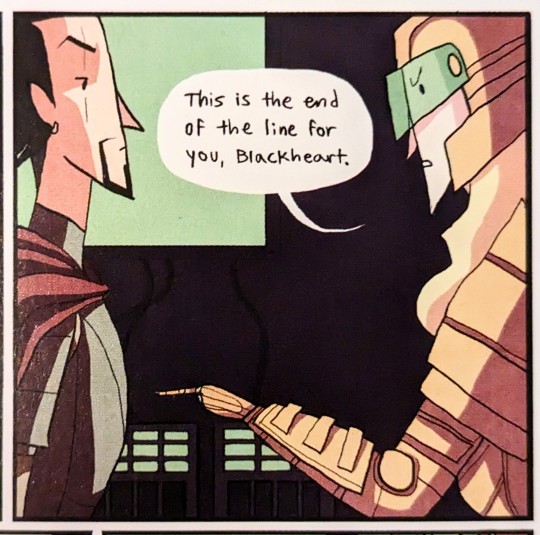
Like I said before, we learn about the joust very early on; Chapter 2, page 5. It is told to us first via Ballister’s perspective. Nimona asks if she can kill Ambrosius while they’re making evil plans, and Ballister says no -- if anyone is going to kill Ambrosius, it’s going to be him. We then get a flashback to the joust itself.
Ballister explains how they were friends and how the joust was the first time they had been pitted against each other. Ballister won fair and square, but in his words:
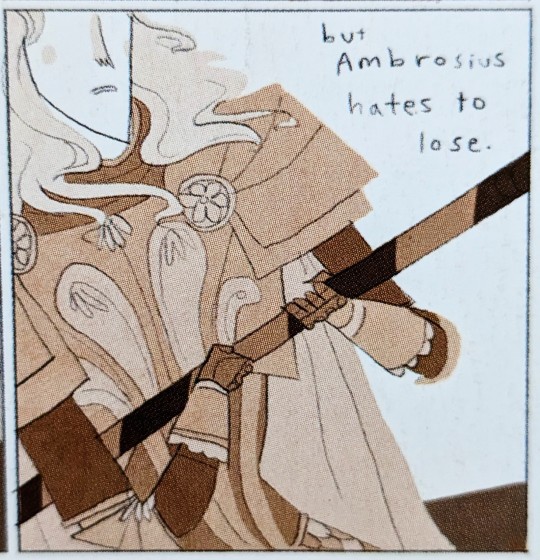
BALLISTER: “but Ambrosius hates to lose.”
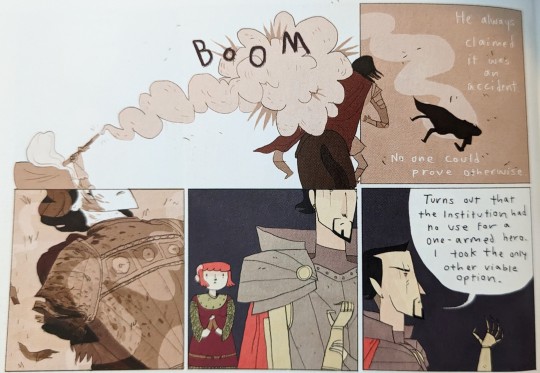
BALLISTER: “He always claimed it was an accident. No one could prove otherwise.”
BALLISTER: “Turns out the Institution had no use for a one-armed hero. I took the only other viable option.”
Ambrosius used a weaponized lance and blasted Ballister’s arm off. After the incident, Ballister was rejected by the Institution, and became a villain instead of the hero he had originally set out to be.
In Chapter 3 we see Ambrosius appear for the first time, and he and Ballister have a very relaxed sort of cartoon hero-villain dynamic going on. There’s definitely real animosity between them, but they don’t hesitate to simply talk casually to each other or help each other when things go south. It’s all pretty lighthearted and lowkey.
They fight briefly, but after Nimona triggers the building they’re in to self-destruct, Ambrosius doesn’t hesitate to help Ballister escape and Ballister doesn’t hesitate to accept his help. Ambrosius even tries to reassure him that Nimona will be fine. After they make it out, with Nimona presumed dead, Ambrosius puts a hand on his shoulder and tells him to go before more guards show up. They may be “arch-nemesises”, but they certainly don’t act like it.
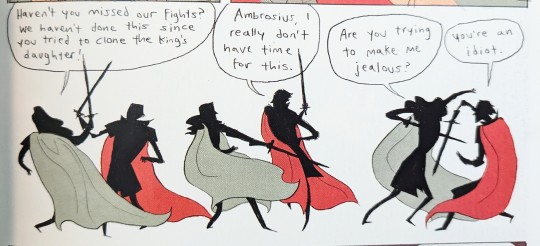
AMBROSIUS: “Haven’t you missed our fights? We haven’t done this since you tried to clone the king’s daughter!”
BALLISTER: “Ambrosius, I really don’t have time for this.”
AMBROSIUS: “Are you trying to make me jealous?”
BALLISTER: “You’re an idiot.”
By the way, I’m not going to be doing a full breakdown of every single scene with them, don’t worry. I just think that their first interaction shows off their dynamic very well. This is presumably how they’ve been with each other since the incident, as it’s made clear both here and throughout the book that they’ve both been doing this for a while at this point. They have a very established dynamic, which is important as that is one of the big differences between the book and the movie. (I’ll get into that more later.)
Whenever these two interact throughout the book, it’s clear that they have very different opinions on the incident that drove them apart and how their relationship functions now.
Ambrosius tries to act like it was simply an accident and that it doesn’t matter. Ballister became a villain of his own volition, and now they are arch-nemesises who have to fight because that’s their job -- though he doesn’t exactly act like he hates Ballister.
Meanwhile Ballister saw it as a deep betrayal, and while he definitely still cares deeply about Ambrosius, he cannot get over the incident as easily as Ambrosius can.
Their respective feelings about what happened are shown perfectly in the scene in Chapter 7 where Ambrosius invites Ballister to meet with him in secret. Ambrosius tells him that the Institution has ordered him to kill Nimona and begs him to send her away, both so he doesn’t have to kill her and so things can go back to “normal.” Ballister then says that Ambrosius gave up normal at the joust.
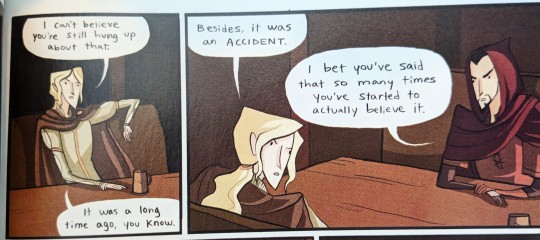
AMBROSIUS: “I can’t believe you’re still hung up about that. It was a long time ago, you know.”
AMBROSIUS: “Besides, it was an ACCIDENT.”
BALLISTER: “I bet you’ve said that so many times you’ve started to actually believe it.”
Ambrosius insists it was an accident, and Ballister claims that he blasted off his arm because he couldn’t stand that Ballister was better than him. This sets Ambrosius off and they begin to argue.
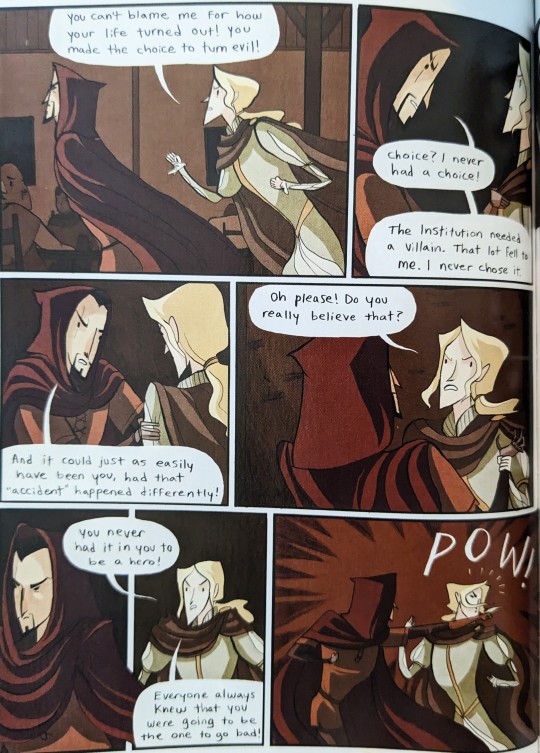
AMBROSIUS: “You can’t blame me for how your life turned out! You made the choice to turn evil!”
BALLISTER: “Choice? I never had a choice! The Institution needed a villain. That lot fell to me. I never chose it.”
BALLISTER “And it could just as easily have been you, had that “accident” happened differently!”
AMBROSIUS: “Oh please! Do you really believe that?”
AMBROSIUS: “You never had it in you to be a hero! Everyone always knew that you were going to be the one to go bad!”
Ambrosius has convinced himself that Ballister chose to become evil, and that he isn’t responsible for what happened because it was an accident. We later learn that it wasn’t an accident though, which means that this really is him just making excuses so he doesn’t have to accept responsibility.
Ballister brings up the idea of Ambrosius becoming like him again after they fight, in one of if not my favorite scene between them in the whole book:
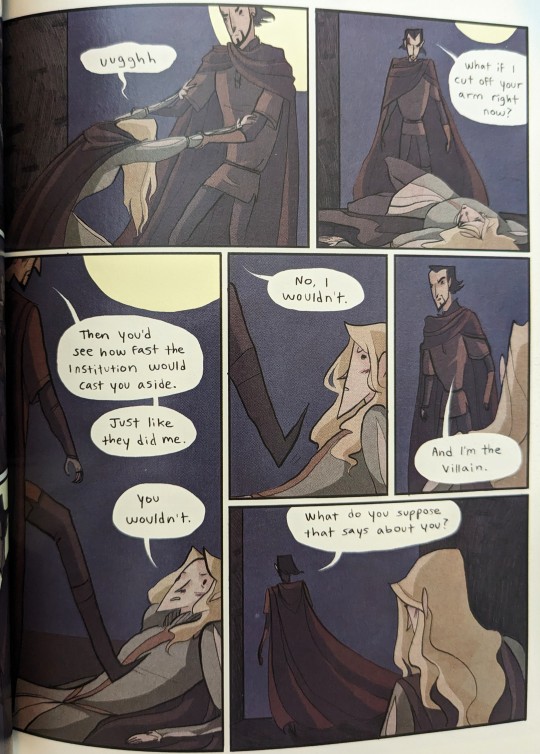
AMBROSIUS: “uugghh”
BALLISTER: “What if I cut off your arm right now?”
BALLISTER: “Then you’d see how fast the Institution would cast you aside. Just like they did me.”
AMBROSIUS: “You wouldn’t.”
BALLISTER: “No, I wouldn’t.”
BALLISTER: “And I’m the villain.”
BALLISTER: “What do you suppose that says about you?”
Ballister and Ambrosius are both very complicated individuals, and I think they lose a lot of their moral grayness in the movie. (Which I will get to later.)
Ambrosius is the “hero”, but it was his ambition that drove him to blast Ballister’s arm off, and he’s never accepted responsibility for it, instead trying to convince himself that Ballister turned out this way because of his own actions. But he doesn’t disagree here that the Institution would throw him out if he were to lose his own arm, which I think is very telling. He knows deep down that he is not a good person, and he is not working for good people. But he doesn’t want to admit it.
Ballister is the “villain”, but in many ways he is better than Ambrosius. He abides by his own rules of never killing unless it’s necessary, and goes out of his way throughout the book to make sure that as few people are harmed as possible. He knows that the Institution is corrupt, because he was one of the people it failed. And he works to try and bring it down.
Ambrosius cannot accept what happened, and because of that they aren’t able to get anywhere. They both know it wasn’t an accident. But because Ambrosius cannot admit it, they are stuck like this.
It’s a fascinating part of Ambrosius’ character that though he is adamant about Ballister being the one to destroy himself, he still cares about him. Much more openly than Ballister does in return, in fact. Ambrosius consistently does whatever he can to avoid having to kill him and always seems to have his wellbeing in mind. While he initially refused to kill Nimona, revolted at the idea that he should be ordered to kill “a little girl”, he eventually agrees to do so, but only under the condition that Ballister would be spared.
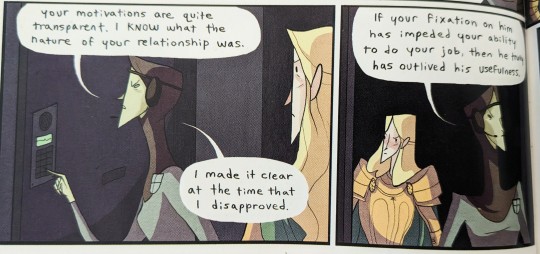
THE DIRECTOR: “Your motivations are quite transparent. I KNOW what the nature of your relationship was. I made it clear at the time that I disapproved. If your fixation on him has impeded your ability to do your job, then he truly has outlived his usefulness.”
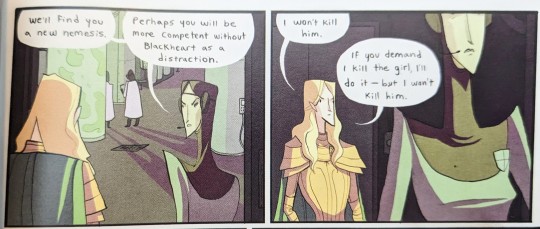
THE DIRECTOR: “We’ll find you a new nemesis. Perhaps you will be more competent without Blackheart as a distraction.”
AMBROSIUS: “I won’t kill him. If you demand I kill the girl, I’ll do it - but I won’t kill him.”
Despite him and Ballister’s separation being his fault, he is the one who wishes most for things to go back to the way they were. And this is likely why he refuses to accept responsibility about the joust. If it were truly an accident, then there shouldn’t be anything preventing them from continuing to be together. By painting it as an accident, Ballister becomes the villain for refusing to move on and let things go back to the way they were, not Ambrosius.
But finally, after Nimona disappears and Ballister lets himself be captured, we get probably the most important scene between these two. Ambrosius has been demoted due to his failure to kill Nimona, and is now forced to guard Ballister’s cell. Ambrosius is at his lowest that he’s been throughout the story, disgraced and discarded by the Institution who he had always been so loyal to.
It’s notable that Ambrosius says here that they both know Ballister is not evil, since he has been paddling that idea this whole time that Ballister made the choice to turn evil. By admitting that he is not, it shows that he is both starting to turn against the Institution, and starting to be more honest about what really happened.
Naturally, after Ambrosius wonders how things ended up like this and reminisces on when they were together, Ballister once again brings up the joust. And finally...
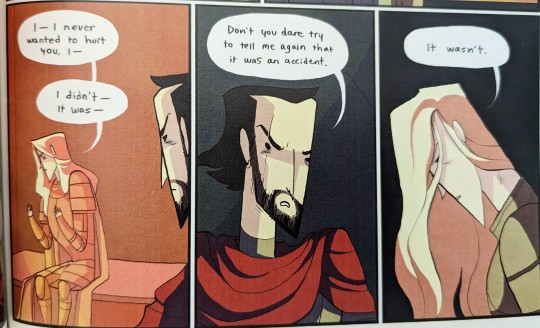
AMBROSIUS: “I- I never wanted to hurt you. I- I didn’t- It was-”
BALLISTER: “Don’t you dare try to tell me again that it was an accident.”
AMBROSIUS: “It wasn’t.”
...he admits the truth.
Ambrosius shares his side of the story, letting both us and Ballister in on what really happened that day. It wasn’t fully his fault -- the Director had called him into her office the night before the joust and told him that he had promise, that he was her choice out of the two, but that he had to prove himself against Ballister or that opportunity would go away.
On the day of the joust, Ambrosius received a weaponized lance instead of his regular one, which he instantly noticed. He asked what the Director expected him to do with it, and was told that she expected him to win.
To Ambrosius’ credit, he had no intention of using it, as he was confident that he would win. But the weight from the weaponized lance threw his balance off, and he ending up losing. And so...
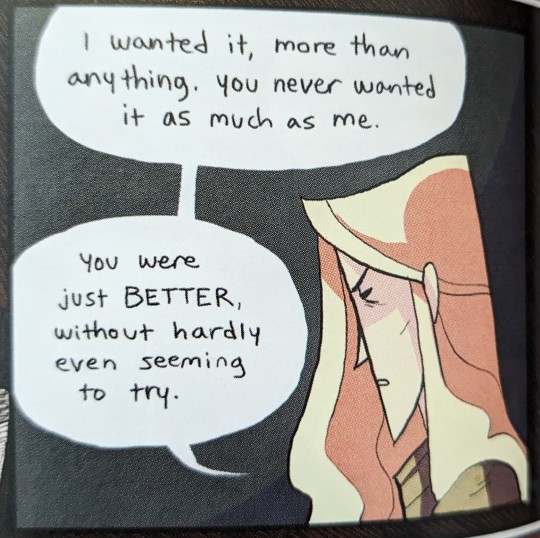
AMBROSIUS: “I wanted it, more than anything. You never wanted it as much as me. You were just BETTER, without hardly even seeming to try.”
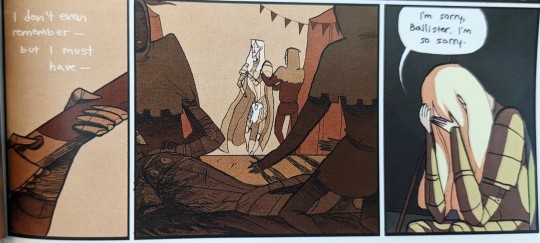
AMBROSIUS: “I don’t even remember- but I must have-”
[...]
AMBROSIUS: “I’m sorry, Ballister. I’m so sorry.”
To be fair, Ambrosius is not entirely to blame here. I doubt he would’ve come up with this idea on his own; he only acted on it because the Director had already given him the weaponized lance, and stressed the night before that the opportunities she dangled in front of him would not be given to him if he did not win. He was manipulated.
But he still made the decision to do it. He could’ve simply not used the lance. But he chose to. It is his fault.
It’s fascinating that the version of events Ambrosius had been swearing by this entire time is the exact opposite of what really happened. He claimed that it was an accident, he didn’t choose to do it, he had no choice, and that it was Ballister’s choice to become evil that caused all of this. But in reality, Ambrosius was the only one who got a choice here. And that choice is why their relationship was destroyed.
Ballister then brings attention to something even more damning:
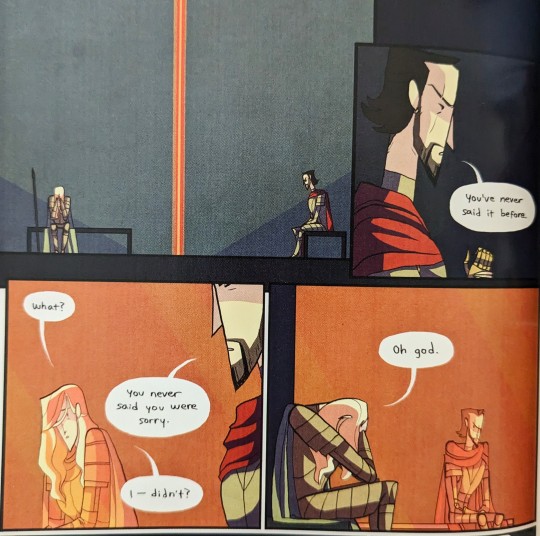
BALLISTER: “You’ve never said it before.”
AMBROSIUS: “What?”
BALLISTER: “You never said you were sorry.”
AMBROSIUS: “I- didn’t?”
AMBROSIUS: “Oh god.”
I feel like you could interpret this in a lot of different ways, but the way I see it, they probably didn’t see each other much right after the incident. Ambrosius was catapulted into stardom as the kingdom’s beloved knight, and Ballister became a villain. I don’t think they really interacted much until their hero-villain antics started up, so I don’t think Ambrosius really had a chance to apologize. And if he did, he didn’t think to. Regardless of why, I do think it is messed up that he never apologized, and it goes to show just how much this event destroyed the bond they used to have.
From here, there’s not too much, as Plot Stuff starts getting serious around this point. Ambrosius ends up betraying the Institution after they continuously attack Ballister to provoke Nimona, attacking the guards who are holding him. This is when Ambrosius finally chooses Ballister over the Institution, which is great for his character, but there’s not really much more than that to say about it.
He and Ballister plan together to try and save the kingdom, with Ambrosius being adamant that they have to kill Nimona while Ballister refuses to. It’s during this conversation that Ambrosius mentions that he “never did anything good [his] whole life”, which is really sad but also kind of accurate, and it goes to show how he’s finally accepted responsibility for everything he’s done and had a part in up to this point.
Eventually Ballister is able to find a way to nerf her and they split up, with Ambrosius wanting to tell him something in case they don’t see each other again, but Ballister shuts him down.
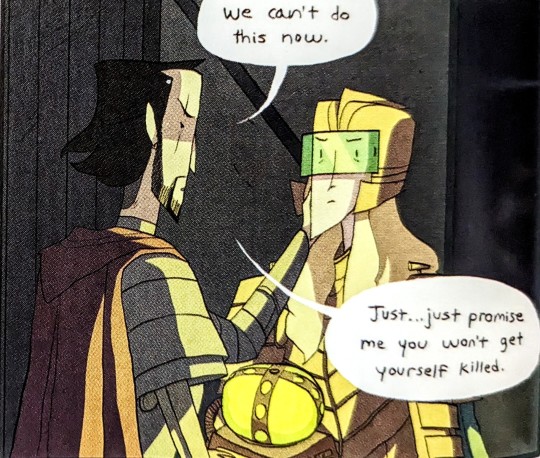
BALLISTER: “We can’t do this now. Just... just promise me you won’t get yourself killed.”
It’s easy to assume this was something romantic and it likely was, but I imagine Ambrosius could’ve also wanted to say sorry again for everything. Perhaps it would’ve been a mix of both.
Regardless, they split up and climax stuff happens: Ambrosius attempts to kill Nimona but gets seriously injured, Ballister tries to reason with Nimona, etc. etc. Eventually at the very end, we see that these two have made peace and are together again, living on after everything. And that’s these two in the book!
Whew. I know that was a lot, but don’t worry. I won’t be going into as much detail about the movie’s version of events, as Ambrosius and Ballister have a much more cut-and-dry dynamic there than in the book. Their relationship in the original is very complex, so I wanted to make sure I covered all of those little nuances.
The joust is what defines their relationship and a lot of their respective characters; it is unimaginably important. Ballister became a villain because he lost his arm and was cast aside by the Institution. Ambrosius became the kingdom’s hero because he took Ballister out of the picture. They are unable to be around each other normally for very long because of their divided views of what happened. It is only after Ambrosius finally faces the truth that they are able to find peace together once more.
All of this is to say that it’s extremely hard to imagine what their relationship would be like in the graphic novel had the joust not happened the way it did. Which brings us to...
Part 2: The Movie (AKA: “My Boyfriend Sliced Off My Arm Because I Literally Killed Someone!”)
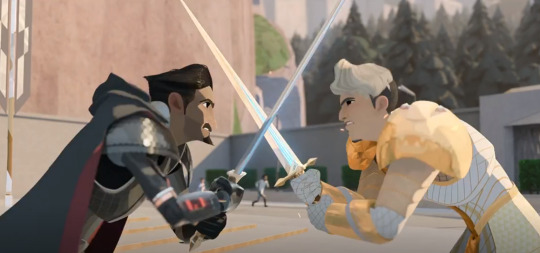
Before we start, I want to again stress that I am not trying to argue that any changes made here are inherently inferior. I am merely pointing out the differences between the book and the movie that contribute to the overall dissonance I and many others have felt when it comes to these two across versions.
Right off the bat, we are greeted with the movie’s version of Ambrosius and Ballister’s backstory. Like was implied in the book, they appear to be together (or something along those lines) which is great to actually see. But it quickly becomes clear that the events here are far different.
Instead of a joust, it is a knighting ceremony. There is no competition between Ballister and Ambrosius here. Ambrosius is knighted and cheered for, and then it is Ballister’s turn. He is knighted and everyone is silent before breaking into cheers as well. And then...

...his sword suddenly turns into a cannon and kills the queen. And in retaliation...


...Ambrosius chops his arm off.
Now if you’ve listened to ANYTHING I’ve said so far, this should immediately set off alarm bells. Because this one little difference changes everything about these two’s dynamic.
In the book, Ambrosius shot off Ballister’s arm in order to win his position. It was an entirely selfish and evil action spurred on only by his uncontrollable want to be the winner.
But here, Ambrosius is debatably justified in his response. Sure, he didn’t have to be as drastic as slicing his whole arm off (and I know there’s symbolism there with how the kingdom has taught people to get rid of problems), but Ballister -- to him -- literally just shot the queen. The queen who Ambrosius has sworn to protect. It is completely reasonable for him to respond in this way. And that’s a huge difference.
By changing this, we already have a completely different situation. Ambrosius here didn’t particularly want to cut Ballister’s arm off, it was a reflex, a response to a sudden danger. (Not saying he wanted to in the book, but there he made the deliberate decision to do so. In the movie it seems much more like an actual accident -- an overreaction that he immediately regrets and, as we’ll see, continues to regret.) And there was justification for it. There was no justification for it in the book.
Instead of an Ambrosius whose ambition caused him to commit an evil act of betrayal against the man he was closest to, we now have an Ambrosius who, in the heat of the moment, overreacted like he was trained to after Ballister seemingly betrayed him. We’ll see over the course of the movie how this affects things, but that’s not the only major change here.
As we figure out shortly afterward, the movie makes a huge change when it comes to how the story functions, and that’s the timeline of events. In the book, the joust and the subsequent fallout between Ballister and Ambrosius happened years ago. We don’t know how long, but it’s clearly been a while. Enough time has passed where they are fully settled into their roles as hero and villain, and they look significantly younger in the flashbacks as well.
Like previously stated, book Ballister has been a villain for a while. He is completely settled into this role and has been making schemes and having fights of the week with Ambrosius for a considerable time. He knows what he’s doing. He has his own way of doing things, and when Nimona inserts herself into his life much of their early dynamic is him teaching her how he does things. In the book, Ballister is the teacher, Nimona is the student.
But in the movie, this incident just happened. It's unclear how exactly long it's been, but judging from Ballister's arm being created and his wounds healing it's probably been around a month.
Regardless of exactly how long it's been, the point is that these events are still very fresh. Ballister seemingly has just been laying low, not villain-ing it up, and he and Ambrosius haven't seen each other since the knighting ceremony. This changes literally everything about Ballister’s character. This post is specifically about Ambrosius and Ballister’s dynamic and not a Ballister character analysis so I’ll try to keep it brief, but movie Ballister seriously could not be more different from the book.
Compare this to movie Ballister, who I’m pretty sure never knows what he’s doing ever, at any point. He was training to be a knight. He has seemingly never once questioned the Institution. Now he has suddenly lost his arm and been thrust out into the unknown of being treated as a villain, and he has no idea how to handle it. Then Nimona shows up, tells him “hey, the Institution sucks”, and eventually he ends up believing so as well. In the movie, Nimona is the teacher, Ballister is the student.
Book Ballister actively resents the Institution and has no doubts that what they did to him is wrong. He has been plotting their downfall for a while. Nimona, on the other hand, seems to be out of the loop when it comes to the Institution and seemingly only starts hating them after she finds out how they threw Ballister out. Again, I’d just like to stress how completely and totally opposite their dynamic in the movie is compared to this.
There’s also Ballister being a scientist and being much more jaded in the book, but that’s not really important for the purposes of this post. So alas, I shall move on.
This different timeframe greatly impacts Ambrosius and Ballister’s dynamic, and obviously it would. There is a huge difference between a falling-out that happened years ago and you’re both still bitter about, and a falling-out that happened very recently. This, along with the different course of events resulting in said falling-out, is what causes their dynamic to feel so alien.

Also while talking about their early interactions in the movie, I’d just like to point out that while here Nimona is the one to assume Ambrosius is Ballister’s arch-nemesis and call him such, which Ballister doesn’t agree with, they were actually arch-nemeses in the book. Just something I noticed.
Something else I find interesting is later on, Ballister seems to be almost in disbelief about Ambrosius cutting off his arm and makes excuses for him.

BALLISTER: “He didn’t cut off my arm. He disarmed a weapon.”

BALLISTER: “It’s how we were trained.”
(Side note, but I wonder if book Ballister ever felt this way right after the joust? Did he try to convince himself it was an accident too, once upon a time? Did he try to make excuses?)
And to be fair, he is sort of right. Like I said before, Ambrosius’ reaction to Ballister seemingly killing the queen was debatably justified. While we’re obviously supposed to side with Nimona here and agree that Ballister should be more upset at Ambrosius for what he did, the movie definitely paints Ambrosius as more sympathetic overall. We see him freaking out internally about cutting off Ballister’s arm, and there is a lot of emphasis placed on how he and the others were trained by the Institution, inviting the audience to place more of the blame on the system that taught Ambrosius to act this way rather than him as a person.
And again, I’m not saying this is a bad thing! I love a good "taking down a corrupt system” story, and with the different circumstances of the movie it definitely makes more sense to play it this way. But in comparison to the book, Ambrosius is much easier to sympathize with. His character is changed from a very morally gray person who did something horrible and won’t admit it, to a pretty okay person who did something horrible and wholly accepts and bemoans that fact. He’s almost the opposite of what he was in the book.
So we have an Ambrosius who accepts what he did to Ballister and feels awful about it, and a Ballister who has no idea what he’s doing and is basically just being dragged around by Nimona. With both of them being basically the complete opposite of how they were in the book, is it any wonder that their relationship with each other feels so different when they themselves are so different?
Also, once again, the circumstances are very different. There is no Queen murder plot in the book, nor is their any attempt to clear Ballister’s name. A significantly different setting makes a difference too.
I don’t see a need to go into further detail about specific scenes in the movie as I think I’ve made my point clear. But going back to the movie’s lack of Ambrosius and Ballister’s already established hero-villain dynamic, I think these differences are made quite apparent just contrasting how they talk to each other. I mean, just compare these two scenes:
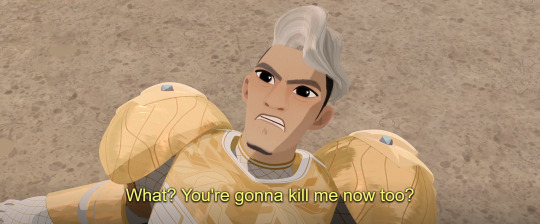
AMBROSIUS: “What? You’re gonna kill me now too?”
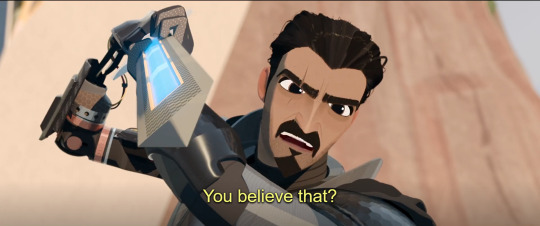
BALLISTER: “You believe that?”

BALLISTER: “Then you never knew me at all.”
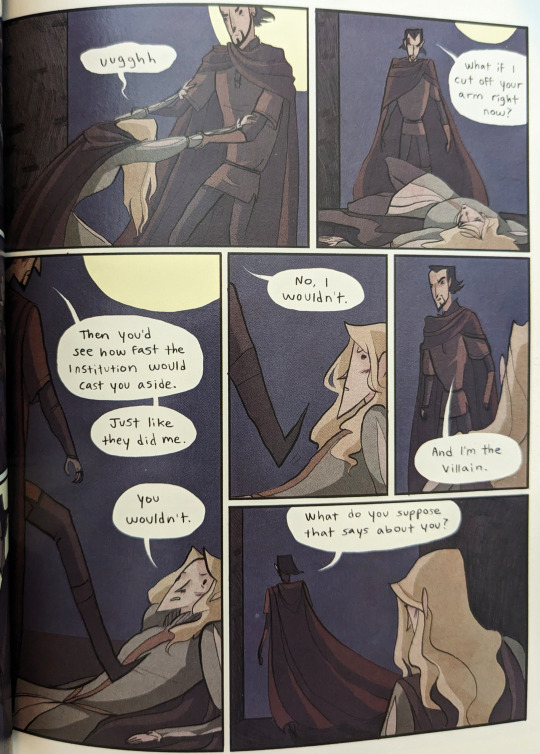
AMBROSIUS: “uugghh”
BALLISTER: “What if I cut off your arm right now?”
BALLISTER: “Then you’d see how fast the Institution would cast you aside. Just like they did me.”
AMBROSIUS: “You wouldn’t.”
BALLISTER: “No, I wouldn’t.”
BALLISTER: “And I’m the villain.”
BALLISTER: “What do you suppose that says about you?”
Their relationship in the movie is much softer and healthier than it was in the book. Their dialogue in the movie tends to lean much more towards tried-and-true “friendship betrayal” stuff; the wound of Ballister’s “betrayal” may be fresher, but it’s clear both of them love each other far more than they resent each other. In the book, it is the opposite. The movie could NEVER have the bar fight scene. It’s too ugly and bitter to fit these softer versions of Ambrosius and Ballister.
Part 3: Conclusion

So, that was a lot. I hope it’s a little clearer now how big the differences are between these two’s dynamic in the book and the movie! Especially if you’re someone who is only familiar with one or the other. While I prefer the book due to me tending to prefer more complex and messy relationship dynamics, I totally understand the appeal of the more loving and healthy relationship Ambrosius and Ballister have in the movie.
To summarize, here are some of the main takeaways:
Ambrosius causing Ballister to lose his arm is completely unjustified in the book and happens due to Ambrosius’ wild ambition, while in the movie it is a debatably justified reflexive action in response to an active threat.
Ambrosius overall is portrayed as much more sympathetic in the movie, with the system itself being more to blame for what happened.
In the book, the main thing keeping them apart was Ambrosius’ refusal to take responsibility and admit what he did. In the movie, it’s a misunderstanding about Ballister seemingly turning evil.
In the book, Ambrosius and Ballister have a very established hero-villain dynamic with the joust having happened years ago. In the movie the “betrayal” is still very fresh, which leads to very different interactions between the two.
And that’s about it! Thank you for reading this very long post. And if you haven’t read the original graphic novel or watched the movie, go do that!!! Much love to ND Stevenson and the rest of the people who made this story come to life.
Let me know your thoughts in the tags or the replies! Which version do you prefer? Are there any other factors you feel have a significant role in why their relationship feels so different? Or do you think I’m totally wrong about this and they feel basically the same to you?
Either way, thanks again for reading and goodbye!
#nimona#ballister boldheart#ambrosius goldenloin#analysis#meta#ballister x ambrosius#ambrosius x ballister#nimona movie#nimona graphic novel#nimona analysis#ballister blackheart
761 notes
·
View notes
Text
Ballister going “what, you think I’m her favorite?” is a funny line but after seeing the whole movie and rewatching it again the line just feels so sad considering the fact that the Director, at that point, had fully orchestrated his framing. And then it got me thinking about how little she cares about both Bal and Ambrosius. They’re just tools, weapons, cogs in the Institute’s machine. And as soon as one stops working or she doesn’t see them fit, she gets rid of them. Ballister was probably supposed to die during his framing, that Jumbotron falling and letting him escape wasn’t apart of her plan. She literally tried to murder “Ambrosius” as soon she thought he was questioning her. And they LOOKED UP TO HER. I love how much I hate the director hhhgh
#nimona#nimona movie#nd stevenson#nimona spoilers#ambrosius goldenloin#ballister boldheart#nimona analysis#netflix nimona#nimona netflix
533 notes
·
View notes
Text
One thing I love about movieverse Goldenheart is just how supportive it is
Like y'all know I talk all the live long day about the comic boys and they DO have me in the fiercest chokehold, but their relationship is special in its own sperate way
The movie boys just have such a supportive and loving aura, you really get the overwhelming impression that they are and always have been on each other's team, them against the world, best friends, lovers, comrades, brothers in arms, just together in every way conceivable. They are each other's rock, and have been for most of their lives.
It makes the events of the movie somehow so much more tragic. Again, the comic is tragic in its own way, but the dynamic is totally different. They are and have been in love for a long time, but even in flashbacks to childhood, and even though it is clear that they had enduring love for one another, they never really were on the same page. The movie boys were. Until suddenly, they weren't.
#nimona#ambrosius goldenloin#goldenheart#nimona graphic novel#ballister blackheart#ballister x ambrosius#ballister boldheart#nimona 2023#blackloin#nimona analysis
199 notes
·
View notes
Text
Noticed how when Ballister calls Nimona a monster
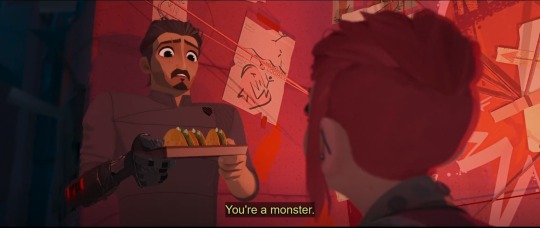
The picture in the background also says "Monster looms", referring to Nimona?

And when he backtracks

There is also an article, calling him a monster?
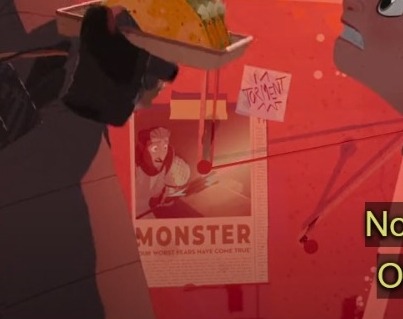
#nimona#nimona movie#nimona film#nimona 2023#ballister boldheart#nimona analysis#nimona and ballister#nimona spoilers
700 notes
·
View notes
Text
Hey guys so I've been watching Nimona again and I noticed some thing a while ago
Look
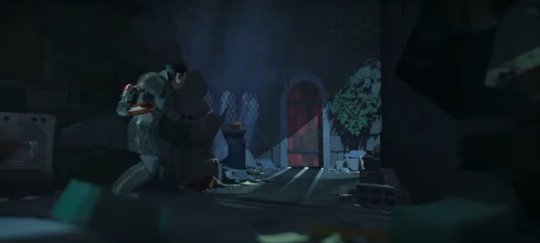
So, at the start of the story we see Ballister react to some knocking sound outside. He grabs a broken bottle and goes slowly, scared for his life probably

At the end of the story, we also see Ballister react to some knocking sound outside. But he isn't scared this time: he's excited

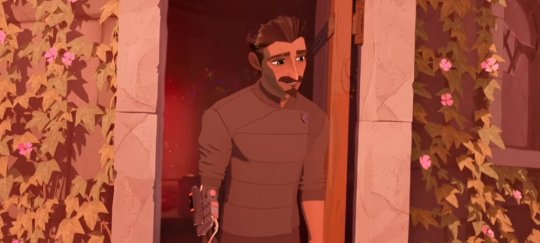
In both situations, he opens the door and doesn't see anyone
And seconds after, he hears: "Hey boss!"
I think it was done very much on purpose and I love it sm... CIRCULAR NARRATIVE OWNS MY HEARTTTTT😭😭😭😭😭😭😭
184 notes
·
View notes
Text
So... Idk maybe this was obvious to everyone and there's no point in me bringing it up. But can we talk about Ballister's armor?
The plate that the knights wear is standardized. It's their uniform. All the knights we see in the film are wearing the same armor and use the same swords. They're standard issue. With a couple exceptions.
Ambrosius gets much flashier armor, with the obvious gold and white colour scheme and the lion (?) design on his chest plate. He also has large lions on the sides of his pauldrons with embedded sapphire eyes, which - wow, talk about ostentatious. This is presumably because of his connections to Gloreth - his blood is special enough that he gets an entirely different and considerably flashier set of armor. Is it a family heirloom? Was it commissioned specifically for him? We'll never know. But the Institute designated this little boy Special enough to be exempt from the dress code in order to demonstrate his status as the Specialist Boy.
Todd gets a slightly altered version of the uniform, with black bottoms instead of grey, and larger pauldrons. If we assume Ambrosius gets fancy armour because of his family connections, then that seems to imply Todd also has some ancestry notable enough to set him aside slightly from the rest of the knights. Not anywhere near as famed as Gloreth of course, but maybe a notable general or war hero or something along those lines. That would explain some of the ego. Whatever.
Both of them seem to still be using the standardized swords though.
And then there's Ballister. With his black armor.
In the book I just sort of assumed he chose that armor in order to compliment the whole aesthetic he's got going on. But in the movie that is explicitly not true. They gave him that armor, to signify in the most literal and inconspicuous way possible that he is the black sheep. He does not belong and he never will, no matter how hard he tries, because the Institute will make sure everyone who sees him immediately recognizes him as other. Street trash who has been graciously permitted into their ranks, but will never be allowed to wear the untainted, pure colours of their order, the divine white and gold. It was decided for him, before he even became a knight, that no matter what he did he would never escape that shadow. That he was let in, not born in. Allowed to exist. Always on their terms.
He doesn't even get to use their swords. He gets a black sword to match his armor, one which (by the looks of it) is significantly lower-tech than the standard issue swords, at least until it was tampered with.
The Queen could have stopped this, but she didn't, which indicates to me more than ever that, to her, Ballister was first and foremost a token. A gesture meant to inspire loyalty and goodwill from her subjects, to prove that she was willing to change. Slowly. And only so long as people remembered who really had the power. Am I saying she was evil or whatever? No. We haven't seen enough of her as a ruler to make those kinds of judgements. But to me she represents a very milquetoast, left-of-center, "Equal-rights-for-everyone-so-long-as-it-doesn't-negatively-affect-me-or-my-standing-in-any-way" kind of leader.
There was no way he could have ever been one of them. Never. And they made sure knew it.
#nimona#nimona 2023#nimona analysis#nimona meta#ballister blackheart#ballister boldheart#nimona ballister#ambrosius goldenloin#nimona ambrosius#I'm in one of those Gay Autism Death Spirals about this movie sorry guys
283 notes
·
View notes
Text
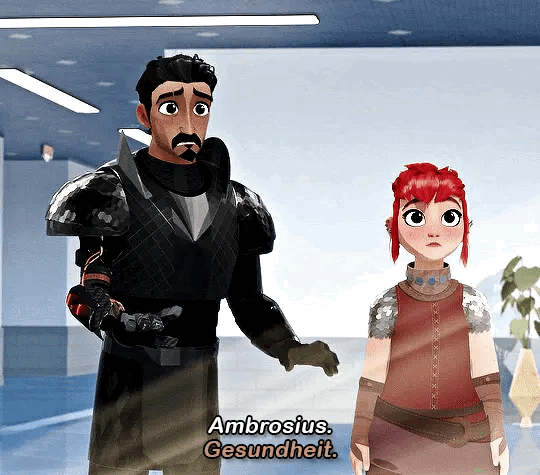
Rolling on the floor at the concept that Ambrosius is canonically a weird ass name, like in-universe it’s not a normal fucking name
Ambrosius Goldenloin
HIS NAME IS IMMORTAL BIGDICK
#i can’t with him#nd stevenson#you did great#ambrosius goldenloin#immortal bigdick#nimona#nimon fanart#nimona ambrosius#nimona movie#nimona analysis#nimona comic#nimona 2023#nimona spoilers#nimona ballister#ambrosius
21K notes
·
View notes
Text
so i just finished watching nimona right
yes, I know it's been like a year since it came out. Sue me. I never had time to watch it.
But, uh. I can't stop thinking about how Nimona - even as an outsider - gets to watch things change. Gloreth doesn't fight for her when her parents call Nimona a monster and try to kill her, but Ballister yells and fights when they electrocute her and pin her down. The first time, she is attacked and almost killed by her own best friend, but the second, she finds something in the realms worth saving, and almost dies of her own accord.
she gets to see how the world evolves and grows and even though it's still not great - it's getting better. She's willing to sacrifice herself for a future where things are better. Yes, she thinks she won't actually die, and she changes into the form with maximum chance of survival, but it's not like she's actually tested this before.
the Nimona movie is special. the book was really good, but it was written in a time when a lot of marginalized communities, particularly the queer community, were hurting, and Nimona was meant to portray the complex struggles of that; how things can't just be fixed like in a fairytale, and the rot has to be torn out. It was a lot more cynical and was meant to inspire outrage at the injustice of a system built on corruption
however, I think the movie fits better for the current political and social climate. it's about how oftentimes, it's the system and not necessarily the people in it that cause harm, about what could be and how people can change, rather than tearing everything down. It gives people the chance to be better, instead of throwing everything out like in the book. I also think we need a happy ending free of guilt or sadness or questions - we have enough of that in our daily lives.
Anyway, I just finished it and absolutely cried. Ta, everyone.
#nimona#ballister boldheart#ambrosius goldenloin#nimona netflix#nimona 2023#ballister blackheart#ballister x ambrosius#nimona analysis#nimona the movie#nimona thoughts#nimona movie#gloreth#nimona the director#nimona spoilers#nimona book#nimona comic
103 notes
·
View notes
Text
okay but like the Director was fully intending for Ballister to die in that arena
she created a replica sword that that self destructed. meaning Ballister was left defenseless and completely surrounded by people that already hated him
it was only by complete chance the chandelier fell, creating an opening for Ballister to escape
otherwise Ballister would’ve been swarmed and killed. and once dead, no one would’ve been able to speak up for him or know his true motive, so the Director would have been able to twist the rhetoric to be about anything she wanted
329 notes
·
View notes
Text
something something nimona being mildly immortal allegory for how trans people have always been here and our struggles have always been real but it's viewed as a new thing with people always seeing nimona as a kid
211 notes
·
View notes
Text
super late to this party but I noticed something in nimona

(id under read more)
[id: screenshot of bal and ambrosius from the nimona movie. bal's head is outlined with a triangle to emphasize the character design of his face, and the square highlight in his eye is also highlighted. Ambrosius' head is similarly outlined with a square, as well as the triangular highlight in his eye. /end id]
65 notes
·
View notes
Text
Nimona is a experience
If you're Cis Straight, the movie is one thing for you
If you're Gay, but still cis, the movie is another thing
And if you're trans, the movie is unique, is like no other
The message, the characters, the plot, the world building, the villain, Nimona themselves
Everything resonates with you, because the movie is not just a trans allegory, it is a message of support, of care.
And a hope for a brighter future, for more love and understanding about us
#Nimona#Nimona Movie#trans#Transgender#Gay#Lesbian#Bisexual#trans girl#Non binary#Genderfluid#Trans masc#Nimona Analysis#Analysis#Nimona is so special for me
139 notes
·
View notes